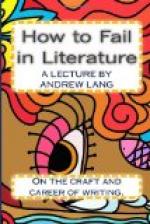You might think that these qualities would displease the reviewer’s editor. Not at all, look at any column of short notices, and you will occasionally find that the critic has anticipated my advice. There is no topic in which the men who write about it are so little interested as contemporary literature. Perhaps this is no matter to marvel at. By the way, a capital plan is not to write your review till the book has been out for two years. This is the favourite dodge of the —–, that distinguished journal.
If any one has kindly attended to this discourse, without desiring to be a failure, he has only to turn the advice outside in. He has only to be studious of the very best literature, observant, careful, original, he has only to be himself and not an imitator, to aim at excellence, and not be content with falling a little lower than mediocrity. He needs but bestow the same attention on this art as others give to the other arts and other professions. With these efforts, and with a native and natural gift, which can never be taught, never communicated, and with his mind set not on his reward, but on excellence, on style, on matter, and even on the not wholly unimportant virtue of vivacity, a man will succeed, or will deserve success. First, of course, he will have to “find” himself, as the French say, and if he does not find an ass, then, like Saul the son of Kish, he may discover a kingdom. One success he can hardly miss, the happiness of living, not with trash, but




